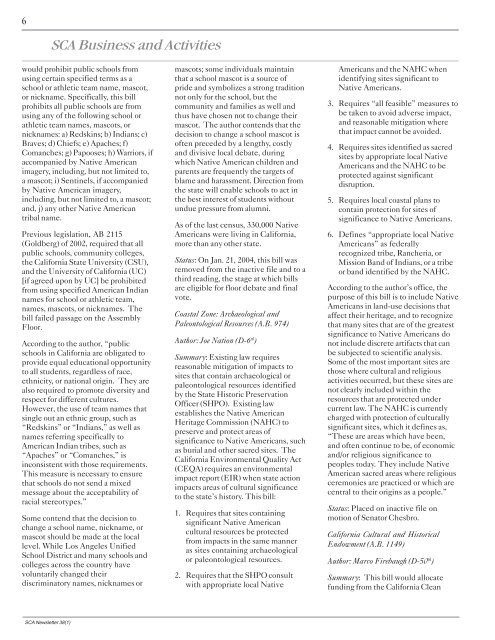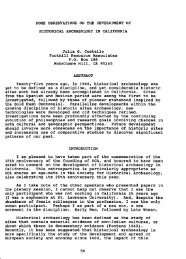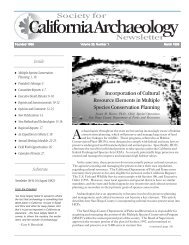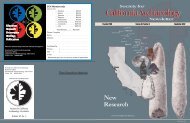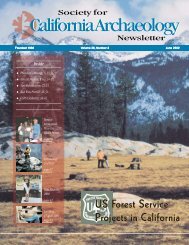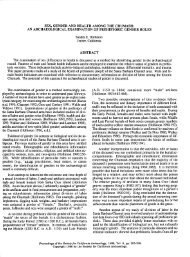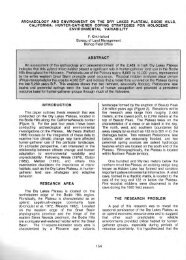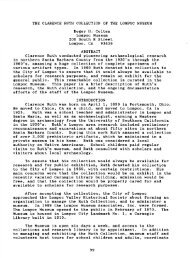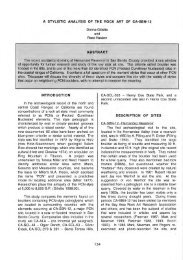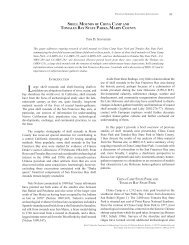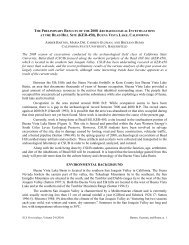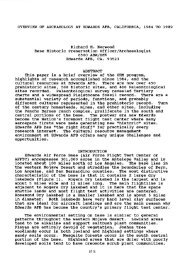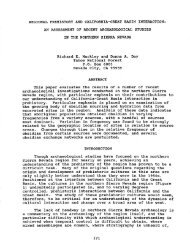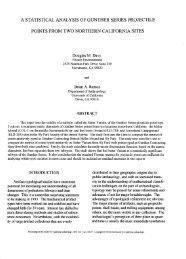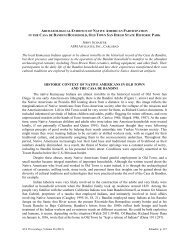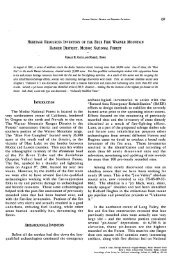March 2004 - Society for California Archaeology
March 2004 - Society for California Archaeology
March 2004 - Society for California Archaeology
You also want an ePaper? Increase the reach of your titles
YUMPU automatically turns print PDFs into web optimized ePapers that Google loves.
6<br />
SCA Business and Activities<br />
would prohibit public schools from<br />
using certain specified terms as a<br />
school or athletic team name, mascot,<br />
or nickname. Specifically, this bill<br />
prohibits all public schools are from<br />
using any of the following school or<br />
athletic team names, mascots, or<br />
nicknames: a) Redskins; b) Indians; c)<br />
Braves; d) Chiefs; e) Apaches; f)<br />
Comanches; g) Papooses; h) Warriors, if<br />
accompanied by Native American<br />
imagery, including, but not limited to,<br />
a mascot; i) Sentinels, if accompanied<br />
by Native American imagery,<br />
including, but not limited to, a mascot;<br />
and, j) any other Native American<br />
tribal name.<br />
Previous legislation, AB 2115<br />
(Goldberg) of 2002, required that all<br />
public schools, community colleges,<br />
the Cali<strong>for</strong>nia State University (CSU),<br />
and the University of Cali<strong>for</strong>nia (UC)<br />
[if agreed upon by UC] be prohibited<br />
from using specified American Indian<br />
names <strong>for</strong> school or athletic team,<br />
names, mascots, or nicknames. The<br />
bill failed passage on the Assembly<br />
Floor.<br />
According to the author, “public<br />
schools in Cali<strong>for</strong>nia are obligated to<br />
provide equal educational opportunity<br />
to all students, regardless of race,<br />
ethnicity, or national origin. They are<br />
also required to promote diversity and<br />
respect <strong>for</strong> different cultures.<br />
However, the use of team names that<br />
single out an ethnic group, such as<br />
“Redskins” or “Indians,” as well as<br />
names referring specifically to<br />
American Indian tribes, such as<br />
“Apaches” or “Comanches,” is<br />
inconsistent with those requirements.<br />
This measure is necessary to ensure<br />
that schools do not send a mixed<br />
message about the acceptability of<br />
racial stereotypes.”<br />
Some contend that the decision to<br />
change a school name, nickname, or<br />
mascot should be made at the local<br />
level. While Los Angeles Unified<br />
School District and many schools and<br />
colleges across the country have<br />
voluntarily changed their<br />
discriminatory names, nicknames or<br />
mascots; some individuals maintain<br />
that a school mascot is a source of<br />
pride and symbolizes a strong tradition<br />
not only <strong>for</strong> the school, but the<br />
community and families as well and<br />
thus have chosen not to change their<br />
mascot. The author contends that the<br />
decision to change a school mascot is<br />
often preceded by a lengthy, costly<br />
and divisive local debate, during<br />
which Native American children and<br />
parents are frequently the targets of<br />
blame and harassment. Direction from<br />
the state will enable schools to act in<br />
the best interest of students without<br />
undue pressure from alumni.<br />
As of the last census, 330,000 Native<br />
Americans were living in Cali<strong>for</strong>nia,<br />
more than any other state.<br />
Status: On Jan. 21, <strong>2004</strong>, this bill was<br />
removed from the inactive file and to a<br />
third reading, the stage at which bills<br />
are eligible <strong>for</strong> floor debate and final<br />
vote.<br />
Coastal Zone: Archaeological and<br />
Paleontological Resources (A.B. 974)<br />
Author: Joe Nation (D-6 th )<br />
Summary: Existing law requires<br />
reasonable mitigation of impacts to<br />
sites that contain archaeological or<br />
paleontological resources identified<br />
by the State Historic Preservation<br />
Officer (SHPO). Existing law<br />
establishes the Native American<br />
Heritage Commission (NAHC) to<br />
preserve and protect areas of<br />
significance to Native Americans, such<br />
as burial and other sacred sites. The<br />
Cali<strong>for</strong>nia Environmental Quality Act<br />
(CEQA) requires an environmental<br />
impact report (EIR) when state action<br />
impacts areas of cultural significance<br />
to the state’s history. This bill:<br />
1. Requires that sites containing<br />
significant Native American<br />
cultural resources be protected<br />
from impacts in the same manner<br />
as sites containing archaeological<br />
or paleontological resources.<br />
2. Requires that the SHPO consult<br />
with appropriate local Native<br />
Americans and the NAHC when<br />
identifying sites significant to<br />
Native Americans.<br />
3. Requires “all feasible” measures to<br />
be taken to avoid adverse impact,<br />
and reasonable mitigation where<br />
that impact cannot be avoided.<br />
4. Requires sites identified as sacred<br />
sites by appropriate local Native<br />
Americans and the NAHC to be<br />
protected against significant<br />
disruption.<br />
5. Requires local coastal plans to<br />
contain protection <strong>for</strong> sites of<br />
significance to Native Americans.<br />
6. Defines “appropriate local Native<br />
Americans” as federally<br />
recognized tribe, Rancheria, or<br />
Mission Band of Indians, or a tribe<br />
or band identified by the NAHC.<br />
According to the author’s office, the<br />
purpose of this bill is to include Native<br />
Americans in land-use decisions that<br />
affect their heritage, and to recognize<br />
that many sites that are of the greatest<br />
significance to Native Americans do<br />
not include discrete artifacts that can<br />
be subjected to scientific analysis.<br />
Some of the most important sites are<br />
those where cultural and religious<br />
activities occurred, but these sites are<br />
not clearly included within the<br />
resources that are protected under<br />
current law. The NAHC is currently<br />
charged with protection of culturally<br />
significant sites, which it defines as,<br />
“These are areas which have been,<br />
and often continue to be, of economic<br />
and/or religious significance to<br />
peoples today. They include Native<br />
American sacred areas where religious<br />
ceremonies are practiced or which are<br />
central to their origins as a people.”<br />
Status: Placed on inactive file on<br />
motion of Senator Chesbro.<br />
Cali<strong>for</strong>nia Cultural and Historical<br />
Endowment (A.B. 1149)<br />
Author: Marco Firebaugh (D-50 th )<br />
Summary: This bill would allocate<br />
funding from the Cali<strong>for</strong>nia Clean<br />
SCA Newsletter 38(1)


